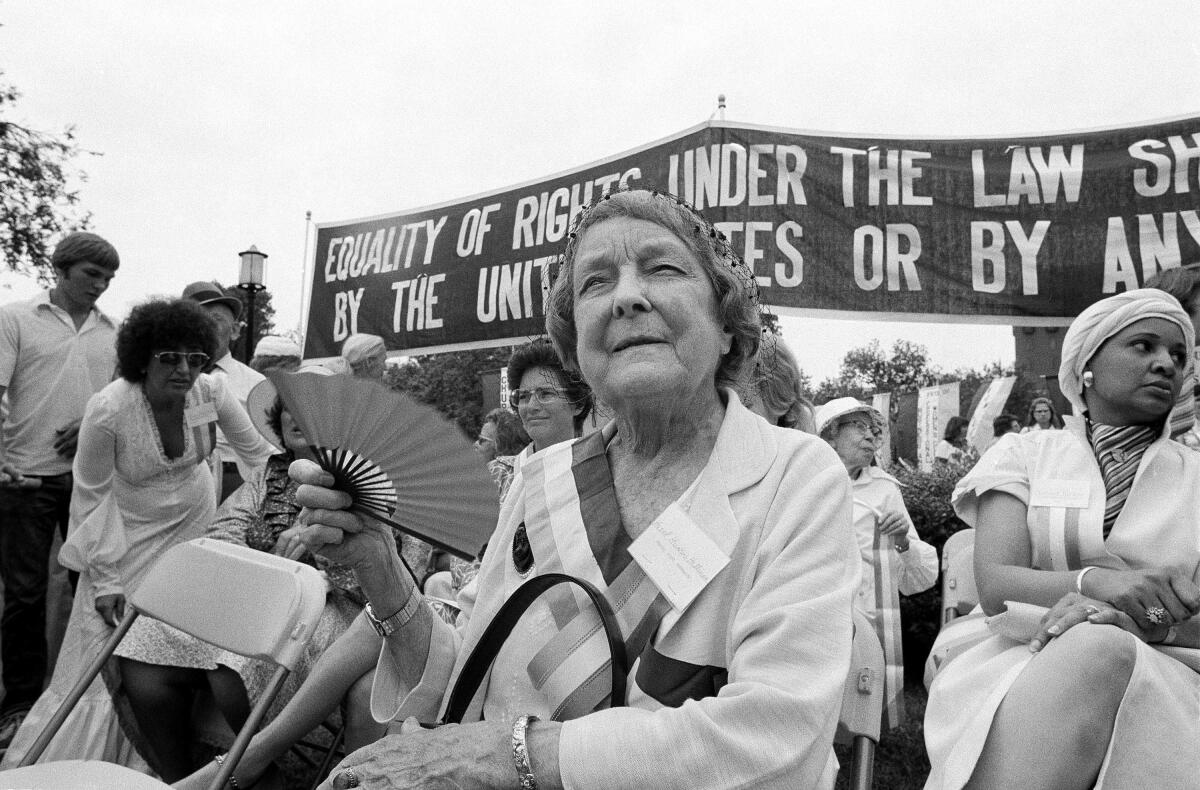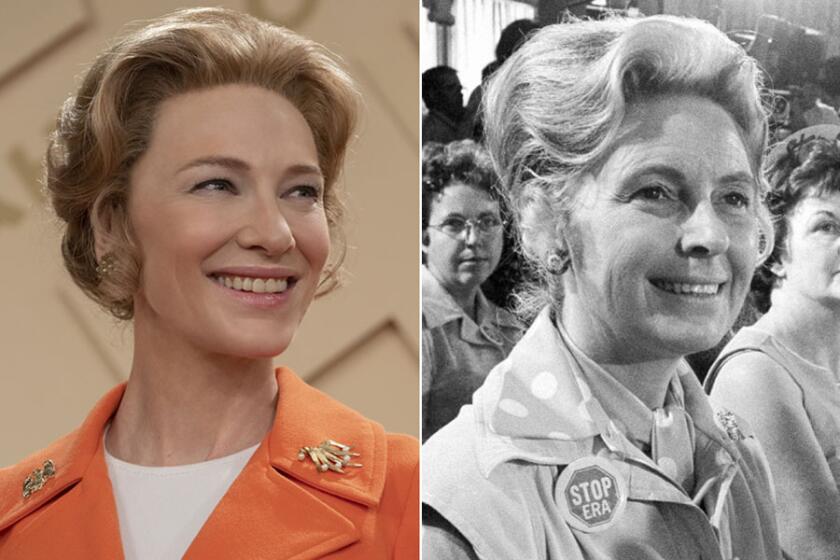Women won the vote but not the suffragists’ larger goal

- Share via
We celebrate Women’s Equality Day on Aug. 26, when the 19th Amendment was officially made part of the U.S. Constitution. Gaining the vote in 1920 was a watershed victory, but even then, many who fought for the franchise recognized it was only a start. It was no guarantee that Black women could vote in many states. And casting a ballot alone could not confer equal citizenship on women.
“Now at last we can begin,” declared suffragist Crystal Eastman, rallying women after the win. The vote, for Eastman, was a means to a larger end: empowering women to escape “being destined by the accident of their sex to one field of activity — housework and child-raising.” And, if women chose motherhood and housework, “to have that occupation recognized by the world as work, requiring a definite economic reward.”
From the movement’s beginning, suffragists fought for rights for mothers and family caregivers. In the 1800s, suffragists supported “voluntary motherhood” and a wife’s right to say no to sex. By the early 1900s, some advocated for physical means of contraception. Mary Church Terrell, founder of the National Assn. of Colored Women (and later the NAACP), campaigned for public kindergartens, nurseries and childcare two decades before she picketed the White House for the vote. Eastman and Alice Paul, and their National Women’s Party, got the first version of the Equal Rights Amendment introduced in Congress in 1923, intended among other things to ensure mothers’ parental rights and married women’s property rights.
There are a record high number of women in Congress, but men hold the power over the ERA.
On the 19th Amendment’s half-century anniversary in 1970, hundreds of thousands of women took to the streets in New York, Los Angeles and 40 other cities still pursuing crucial elements of the suffragists’ empowerment agenda. The Women’s Strike for Equality, led by Betty Friedan and Aileen Hernandez, the first presidents of the National Organization for Women, sought adoption of the Equal Rights Amendment, held up by a few Senate opponents, and advanced three demands: access to abortion, universal childcare, and equal opportunity in education and employment.
Women at home and in workplaces stopped business as usual on Aug. 26, 1970. They organized “baby-ins” in parks to enable mothers to march. A young Eleanor Holmes Norton, later elected the District of Columbia’s delegate in Congress, emphasized that the prohibition of sex discrimination in employment was “an empty mandate unless the women have a place to leave their children.”
In the aftermath of the strike — the largest women’s protest in the U.S. until the massive 2017 Women’s March — Congress passed the ERA and 30 states ratified it quickly; legislation strengthened anti-discrimination protections in employment, education and credit; and the courts decriminalized abortion. Though few recall it now, in 1971 Congress even voted to provide crucial free national childcare across income levels.
In congressional hearings on the Comprehensive Child Development Act, Rep. Shirley Chisholm (D-N.Y) directly connected the lack of childcare to women’s exclusion from political power.
“The day care disaster we face in the United States,” she said, “is the result of America’s tradition of discrimination against women. ... It’s all part of a pattern. Look around you. Out of 435 members of the House, 10 are women.” Chisholm was not only the first Black woman elected to Congress, but she also ran a day care before her career in elected office.
The childcare bill passed both houses, embraced with a bipartisan vote in the House and the Senate, only to be vetoed by President Nixon. He sided with rising New Right conservatives (and nascent culture warriors) when he claimed broadly accessible childcare would diminish “parental” (read: mothers’) “involvement with children.” Attacking childcare and “women’s lib,” Phyllis Schlafly helped block ratification of the ERA by its 1982 deadline.
Now 100 years have passed since women won the vote, and although we are closer to exercising all the freedoms hoped for in 1920 and demanded in the 1970s, we are further away from collective action on the crucial issue of childcare. The COVID-19 pandemic makes painfully clear how our failure to support childcare harms women.
All workers caring for children and dependent family members are struggling during the shutdown. But women end up paying the highest price when institutional support for care is unavailable. Between March and April, according to a Washington University study released in July, mothers reduced their working hours four to five times as much as fathers. Even before the pandemic, the lack of public support for childcare, including the lack of guaranteed paid family leave, made women more likely than men to exit the labor market to care for children and other family members. Women’s disproportionate role in childbearing and child-rearing, according to economists, largely accounts for the gender pay gap.
For all of these reasons, the 19th Amendment’s promise of equal citizenship will remain unfinished business until we create an infrastructure that allows for the sharing of child raising, and for meeting the needs of other dependent family members, across genders and in the community beyond the family. It would help if we sent more women to Congress — the current record number of female members amounts to just 23.2% in the House and 26% in the Senate, not enough to pass legislation so many Americans need.
For seven decades, the battle for women’s suffrage was also a battle to bring democracy to family life. A century later, key elements of that goal remain unmet. Will it take another 100 years to remedy that failure?
Reva B. Siegel, a professor at Yale Law School, is the author of the Yale Law Review Forum article “The Nineteenth Amendment and the Democratization of the Family.” Julie C. Suk is a professor of sociology and political science at City University of New York, a visiting professor at Yale Law School and the author of the ERA history “We the Women.”
More to Read
A cure for the common opinion
Get thought-provoking perspectives with our weekly newsletter.
You may occasionally receive promotional content from the Los Angeles Times.










